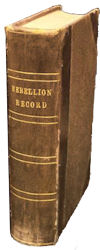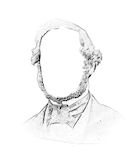
—By proclamation of Jefferson Davis, this day was observed as a fast-day throughout the States in rebellion against the U. S. Government.—N. Y. Times, June 2.
—The United Turner Rifles, Twentieth Regiment N. Y. S. V., Colonel Max Weber, left New York for Fortress Monroe and the army of Southeastern Virginia. In their march through the city they were drawn up in front of the City Hall, where a flag was presented to them by Samuel B. Ruggles, in behalf of Mrs. Charles E. Strong and other ladies of New York.—(Doc. 248.)
—Brigadier-General Schenck has been assigned to the Second Michigan Regiment now in Washington. He is thus attached to the Military Department of Washington, the chief of which is General Mansfield.—Conflicting statements having been made, it is proper to say—while Major-General Banks superseded General Cadwalader in command of the Department at Annapolis, the latter has been assigned to command a new division to cooperate with General Patterson in the progressing action against Harper’s Ferry.—Rochester Union, June 14.
—The steamer Iatan, with the Second Battalion of the First Regiment of Missouri volunteers, under command of Lieutenant Colonel Andrews, one section of Totten’s light artillery and two companies of regulars, under Captain Lathrop, and the steamer J. C. Swon, with the First Battalion of the First Regiment, under Colonel Blair, and another section of Totten’s battery, and a detachment of pioneers, and General Lyon and staff, numbering 1,500 men all told, left St. Louis for some point up the Missouri River, supposed to be Jefferson city. They had horses, wagons, and all necessary camp equipage, ammunition, and provisions for a long march.—Louisville Journal, June 14.
—The troops which started from Washington on Monday, left the vicinity of Tenlytown the next day, and are now beyond Rockville; the National Rifles, under Major Smead, the Slemmer Guards, Capt. Knight, and the Cameron Guards, accompanied by Capt. Magruder’s battery of U. S. Artillery, with three field-pieces, being in advance. The troops have taken the river route, and will be followed immediately by the First Pennsylvania and New York Ninth Regiments, which were at Rockville on Tuesday. What is called the river route is the road which diverges from the Frederick Road outside of Rockville, and passes through Poolesville direct to Edwards’ Ferry and on to Leesburg, Va. For several weeks past the Edwards’ Ferry route has been a general thoroughfare for secessionists from Maryland, and also for military stores, provisions, etc. The Fifth Battalion D. C. Volunteers took boats at the Chain Bridge yesterday morning at eight o’clock, and proceeded towards Edwards’ Ferry. This battalion is commanded by Lieut.-Col. Everett.— Washington Star, June 12.
—The Third Michigan Regiment, numbering 1,040 men, left Grand Rapids this morning for the seat of war. They are a fine body of men fully armed, equipped, and ready for service.—N. Y. Commercial Advertiser, June 13.
—The Sixth Regiment N. Y. S. V., Colonel William Wilson’s Zouaves, left New York for Fort Pickens. Previous to its departure the regiment was presented with a set of colors by the ladies of the Relief Committee.—(Doc. 249.)
—A portion of Montgomery’s men, under Capt. Jamison, armed with Sharp’s rifles and revolvers, reached Wyandotte, Kansas, from Lawrence under orders from Col. Mitchell. Montgomery, with several hundred mounted men, will at once take possession of the Kansas side of the Missouri line, so as to be ready to meet Gov. Jackson’s forces whenever they make a movement from Independence towards Kansas City. The militia and volunteer companies are ready to march to the order, as soon as the orders are sent.—St. Louis Democrat, June 18.
—The largest meeting ever known in Dover, Delaware, was held there to-day. Chancellor Harrington presided. The following, among other resolutions, was adopted unanimously: Resolved, That, considering the sentiments embodied in the foregoing resolution, incompatible with the views of James A. Bayard, now Senator, as expressed in his last speech in the Senate, and his recent addresses to the people of Delaware, we most respectfully request him to resign.
Not less than three thousand persons were at the meeting, and great enthusiasm prevailed. A resolution was also passed requesting the Governor to call the Legislature together.—Rochester Union, June 14.
—An attack was made by the rebels on the outpost of the Pennsylvania Fifth regiment at Alexandria, in which a private of company G was wounded in the arm. His arm was amputated.—N. Y. Commer. Advertiser, June 14.
—Gen. Beauregard ordered the Fairfax Court-House Company, Capt. Ball, recently prisoners in Washington, to leave the State of Virginia, because they took the oath of allegiance to the United States. Those of them who may be induced to violate it, will, of course, be excepted from the operation of this order.—N. Y. World, June 15.
![]()










